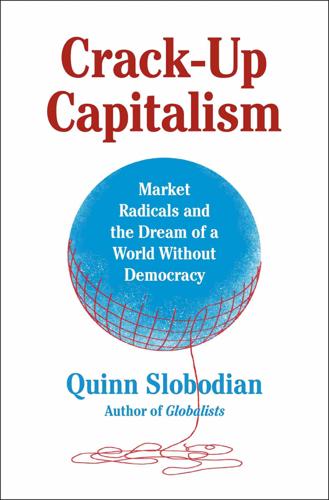
Crack-Up Capitalism: Market Radicals and the Dream of a World Without Democracy
by
Quinn Slobodian
Published 4 Apr 2023
New Individualist Review 2, no. 2 (Summer 1962); and Friedman and Friedman, Two Lucky People: Memoirs, 372. 14. David Friedman, “The Radical: Figs from Thistles,” New Guard (Summer 1969): 19. 15. Stan Lehr and Louis Rossetto Jr., “The New Right Credo-Libertarianism,” New York Times Magazine, January 10, 1971, https://www.nytimes.com/1971/01/10/archives/the-new-right-credo-libertarianism.html. 16. David Friedman, “Problems with Libertarianism” (1981), http://www.daviddfriedman.com/Ideas%20I/Libertarianism/Problems.pdf. 17. Friedman, Capitalism and Freedom, 32. 18. David Friedman, The Machinery of Freedom: Guide to a Radical Capitalism (New York: Harper Colophon, 1973). 19.
…
Its director was Rothbard’s kindred spirit and closest partner, Llewellyn “Lew” Rockwell Jr., both a radical libertarian and an advocate of racial separatism ever since his first position at the conservative publisher Arlington House (named, with little subtlety, after the last residence of Confederate general Robert E. Lee). As an editor, Rockwell commissioned books on the disastrous effects of desegregation and the betrayal of white politics in southern Africa, published alongside David Friedman’s Machinery of Freedom and panic-mongering bestsellers like How to Profit from the Coming Devaluation.17 One book Rockwell pitched to an author was called Integration: The Dream that Failed; his personal opinion was that the only option was a “de facto segregation for the majority of both races.”18 Like Rothbard, Rockwell combined extreme laissez-faire politics with a fixation on race.
…
For public occasions, he sometimes added a gold medallion with a torch of liberty wrapped in the DONT TREAD ON ME snake of the Gadsden flag and the letters TANSTAAFL, for his father’s well-known coinage: “There Ain’t No Such Thing as a Free Lunch.”16 David Friedman’s politics leaned much further toward actual statelessness than those of his father. Milton was a skeptic of public education but he believed that government was necessary for a range of other functions, from law and order to property rights, printing and controlling money, and even, at times, fighting monopoly and punishing polluters.17 As he often insisted, he was no anarchist. His son, by contrast, was. Two years out from his physics doctorate, David published a manifesto titled The Machinery of Freedom: Guide to a Radical Capitalism.18 The book staked out an extreme position, joining Murray Rothbard’s call for anarcho-capitalism, defined as a system in which all state services—from roads to courts and the police—would be privatized.
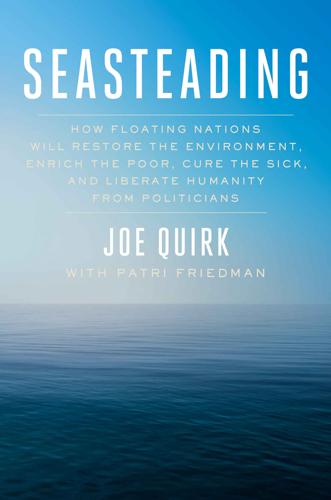
Seasteading: How Floating Nations Will Restore the Environment, Enrich the Poor, Cure the Sick, and Liberate Humanity From Politicians
by
Joe Quirk
and
Patri Friedman
Published 21 Mar 2017
Floating cities that best pleased their inhabitants would expand, while others which failed to do so would decline and disappear. Democracy, a system by which majorities outvote minorities, would be upgraded to a system whereby the smallest minorities, including the individual, could vote with their houses. David Friedman described a machinery of freedom. Milton Friedman advocated the freedom of choose. Patri identified a machinery of freedom to choose. In his now defunct personal blog, he proposed an idea that became contagious: imagine ten thousand homesteads on the sea—“seasteads”—where ocean pioneers will be free to experiment with new societies. Aquatic citizens could live in modular pods that can detach at any time and sail to join another floating city, compelling ocean governments to compete for mobile citizens like companies compete for customers.
…
See the Sea The globally emerging Blue Revolution became conscious of itself when Google engineer Patri Friedman realized that the economic theories elucidated by his grandfather, Milton Friedman, and developed by his father, David Friedman, would soon be put to the test by a rapidly approaching technology. Milton and David each asserted that political conflict was caused by political power, and that the solution to political conflict lay not in further consolidating power in the most virtuous government officials, but by the radical decentralization of power among millions of individuals with freedom and choice. How could such an organic bottom-up system work? In 1973 David published The Machinery of Freedom, describing the practical details, and Milton and his wife, Rose, later wrote Free to Choose, explaining the moral principles.
…
Sixteen of the top twenty richest countries in the world are coastal states except Switzerland, Luxembourg, Austria—and San Marino is a ten-minute drive from the Adriatic Sea. wealth emerges from fluidity and flow: J. Hagen, “Trade Routes for Landlocked Countries,” UN Chronicle 40, no. 4 (2003): 13. “Consider our world as it would be if the cost of moving from one country to another were zero”: David Friedman, The Machinery of Freedom: Guide to a Radical Capitalism (New York: Harper & Row, 1973), 123. “estimate the gains from eliminating various barriers to trade, capital flows, and migration”: Michael A. Clemens, “Economics and Emigration: Trillion-Dollar Bills on the Sidewalk?,” Journal of Economic Perspectives 25, no. 3 (Summer 2011): 83–106, http://pubs.aeaweb.org/doi/pdfplus/10.1257/jep.25.3.83.
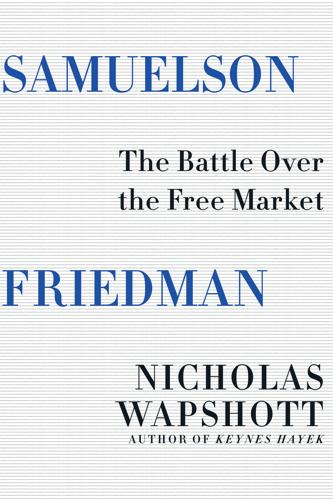
Samuelson Friedman: The Battle Over the Free Market
by
Nicholas Wapshott
Published 2 Aug 2021
Taylor interview with Friedman. http://web.stanford.edu/~johntayl/Onlinepaperscombinedbyyear/2001/An_Interview_with_Milton_Friedman.pdf. 3.Interview with Friedman for the WGBH economics series Commanding Heights, 2002. https://www.pbs.org/wgbh/commandingheights/shared/minitext/int_miltonfriedman.html. 4.Aaron Director inspired a generation of conservative jurists, including Robert Bork, Richard Posner, Antonin Scalia, and Chief Justice William Rehnquist. 5.Friedman’s biographical note for the Nobel Prize committee. http://www.nobelprize.org/nobel_prizes/economic-sciences/laureates/1976/friedman-bio.html. 6.David Friedman (born February 12, 1945), American economist, physicist, legal scholar, and anarcho-capitalist theorist, followed his parents into economics, sharing their belief in free markets and libertarian thinking. He wrote The Machinery of Freedom (1973), which advocates an anarcho-capitalist society. 7.Friedman left the shoe store job abruptly after receiving just a seventy-five-cent commission for a twelve-hour day. 8.Warsh, “The Rivals,” Economic Principals blog, July 12, 2015. http://www.economicprincipals.com/issues/2015.07.12/1758.html. 9.Harold Hotelling (September 29, 1895–December 26, 1973) was a mathematical statistician and an economic theorist He was Associate Professor of Mathematics at Stanford University 1927–1931, a member of the faculty of Columbia University 1931–1946, and Professor of Mathematical Statistics at the University of North Carolina at Chapel Hill from 1946 until his death.
…
“We’ve lost a giant in economics.”23 And he told the New York Times, “Friedman thought of himself as a man of science, but was in fact more full of passion than he knew.”24 Samuelson was to reserve a more damning assessment of Friedman’s life and career for a more fitting time. On the death of Rose Friedman, on August 18, 2009, Samuelson wrote a letter of condolence to Friedman’s children, David Friedman and Janet Martel, both living in California, and “the entire Friedman Family.” “Milton’s abilities were self-evident from the beginning,” he wrote. “For two-thirds of a century, despite the differences in our value judgments, we were able to maintain civil discourse. I think that was a tribute to both of us.”25 David Friedman replied, “It is indeed a good thing when people can disagree and get along in a peaceable and even friendly fashion.” But he took Samuelson to task for writing in his condolence letter that he and Milton Friedman enjoyed “differences in value judgments.”
…
He cofounded and headed Solidarity (Solidarność), won the Nobel Peace Prize in 1983, and served as president of Poland, 1990–1995. 63.Friedman, Capitalism and Freedom, p. 4. 64.Ibid., p. 9. 65.Friedman and Friedman, Two Lucky People, p. 396. 66.Friedman, Capitalism and Freedom, p. 3. CHAPTER 13: END OF THE LINE 1.Samuelson, Economics, 5th ed. (1961), p. 819. 2.According to his son David Friedman, “He was probably in favor of the idea of free love early on, judging by something he once said, probably concluded it was a bad idea later, but would never have described it as socialism, since it obviously wasn’t.” Email to author, January 19, 2021. 3.Friedman and Friedman, Free to Choose, p. 25. 4.Friedman was an exception. As his son David Friedman explained, “From my father’s point of view, describing how socialism works in practice was one way of showing things wrong with it.”
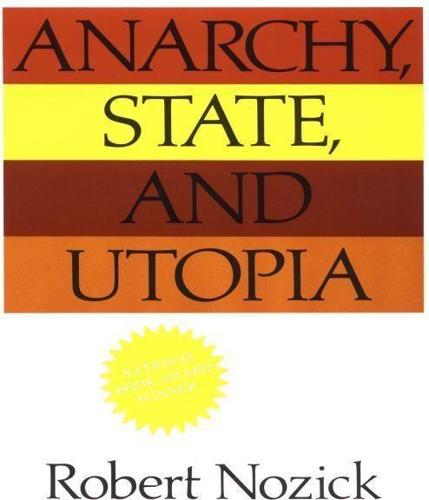
Anarchy State and Utopia
by
Robert Nozick
Published 15 Mar 1974
The most detailed discussion I know is in Morris and Linda Tannehill, The Market for Liberty (Lansing, Mich.. privately printed, 1970), especially pp. 65-115. Since I wrote this work in 1972, Rothbard has more extensively presented his views in For a New Liberty (New York: Macmillan, 1973), chaps. 3 and II, and David Friedman has defended anarcho-capitalism with gusto in The Machinery of Freedom (New York: Harper & Row, 1973), pt. III. Each of these works is well worth reading, but neither leads me to revise what I say here. 5 See I. B. Singer, In My Father’s Court (New York: Farrar, Strauss, and Giroux, 1966); for a recent “counterculture” example see WIN Magazine, November 1, 1971, pp. 11-17. 6 Exercise for the reader: describe how the considerations discussed here and below lead to each geographical area having one agency or a federal structure of agencies dominant within it, even if initially the area contains a group of agencies over which “wins almost all the battles with is a connected relation and a non transitive one. 7 See Kenneth R.
…
as Nothing hangs on the fact that here and elsewhere I speak loosely of needs, since I go on, each time, to reject the criterion of justice which includes it. If, however, something did depend upon the notion, one would want to examine it more carefully. For a skeptical view, see Kenneth Minogue, The Liberal Mind, (New York: Random House, 1963), pp. 103-112. at I have not seen a precise estimate. David Friedman, The Machinery of Freedom (N.Y.: Harper & Row, 1973), pp. xiv, xv, discusses this issue and suggests 5 percent of U.S. national income as an upper limit for the first two factors mentioned. However he does not attempt to estimate the percentage of current wealth which is based upon such income in the past.
…
Nonlinear Programming: Sequential Unconstrained Minimization Techniques, New York: Wiley, 1968. Fletcher, George P. “Proportionality and the Psychotic Aggressor.” Israel Law Review 8, no. 3:367-90. Fried, Charles. An Anatomy of Values. Cambridge: Harvard University Press, 1970. Friedman, David. The Machinery of Freedom. New York: Harper & Row, 1973. Friedman, Milton. Capitalism and Freedom. Chicago: University of Chicago Press, 1962. Gierke, Otto. Natural Law and the Theory of Society, 1500-1800. Cambridge: Cambridge University Press, 1934. Ginsburg, Louis. Legends of the Bible. Philadelphia: The Jewish Publication Society of America, 1956.
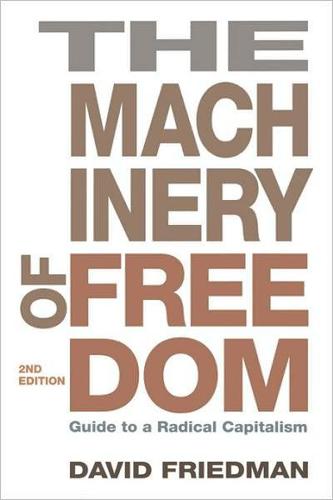
Machinery of Freedom: A Guide to Radical Capitalism
by
David Friedman
Published 2 Jan 1978
CHESTERTON — AN AUTHOR REVIEW APPENDIX 2 MY COMPETITION Fiction Economics Law and Economics Public Policy History Libertarian Ideology The Libertarian Movement Miscellaneous Some More of My Articles that You May (or May Not) Find of Interest Magazines Organizations Institutes Sources THE MACHINERY OF FREEDOM GUIDE TO A RADICAL CAPITALISM second edition David Friedman This book is dedicated to Milton Friedman Friedrich Hayek Robert A. Heinlein, from whom I learned and to Robert M. Schuchman, who might have written it better Capitalism is the best. It's free enterprise. Barter. Gimbels, if I get really rank with the clerk, 'Well I don't like this', how I can resolve it?
…
Table of Contents THE MACHINERY OF FREEDOM PREFACE TO THE SECOND EDITION PREFACE TO THE FIRST EDITION ACKNOWLEDGEMENTS INTRODUCTION IN DEFENSE OF PROPERTY IN DEFENSE OF PROPERTY A NECESSARY DIGRESSION LOVE IS NOT ENOUGH INTERLUDE ROBIN HOOD SELLS OUT THE RICH GET RICHER AND THE POOR GET RICHER MONOPOLY I: HOW TO LOSE YOUR SHIRT MONOPOLY II: STATE MONOPOLY FOR FUN AND PROFIT EXPLOITATION AND INTEREST I DON'T NEED NOTHING LIBERTARIAN GRAB BAG OR HOW TO SELL THE STATE IN SMALL PIECES SELL THE SCHOOLS A RADICAL CRITIQUE OF AMERICAN UNIVERSITIES THE IMPOSSIBILITY OF A UNIVERSITY ADAM SMITH U.
…
In the third, I discuss what a future libertarian society might be like and how it could be achieved. The final section contains new material on a variety of topics added in the second edition. The purpose of this book is to persuade you that a libertarian society would be both free and attractive, that the institutions of private property are the machinery of freedom, making it possible, in a complicated and interdependent world, for each person to pursue his life as he sees fit. IN DEFENSE OF PROPERTY A saint said "Let the perfect city rise. Here needs no long debate on subtleties, Means, end, Let us intend That all be clothed and fed; while one remains Hungry our quarreling but mocks his pains.
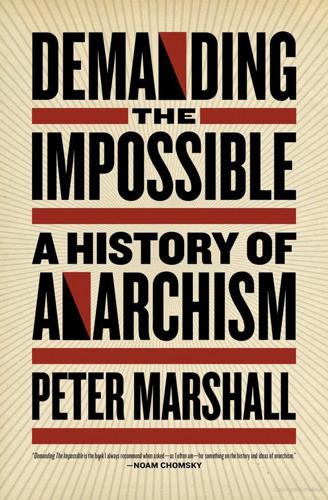
Demanding the Impossible: A History of Anarchism
by
Peter Marshall
Published 2 Jan 1992
They maintain that even the minimal State is unnecessary since the defence of person and property can be carried out by private protection agencies. David Friedman sees such agencies as both brokers of mini-social contracts and producers of ‘laws’ which conform to the market demand for rules to regulate commerce. Each person would be free to subscribe to a protective association of his choice, since ‘Protection from coercion is an economic good’.5 Apart from adumbrating The Machinery of Freedom (1971), Friedman sees capitalism as the best antidote to the serfdom of collectivism and the State. The writings of Ayn Rand, a refugee from the Soviet Union, best represent the intellectual background to the new right-wing libertarianism in the United States.
…
Roussopoulus (Montréal: Black Rose, 1986), p. 170 36 ‘Blood of the Flower: An Anarchist-Feminist Statement’ Siren - A Journal of Anarcho-Feminism, I, 1 (1971) 37 ‘Who We Are: An Anarcho-Feminist Manifesto’, ibid. 38 See Penny Kornegger, ‘Anarchism: the feminist connection’, Reinventing Anarchy, op. cit., p. 240 39 Carol Ehrlich, ‘Socialism, anarchism, feminism’, Reinventing Anarchy, op. cit., p. 265 40 Kornegger, ‘Anarchism: the feminist connection’, ibid., p. 240 41 Lynne Farrow, ‘Feminism as Anarchism’, Quiet Rumours: An Anarcha-Feminist Anthology (Dark Star, n.d.), p. 11 42 See Marian Leighton, ‘Anarcho-feminism’, Reinventing Anarchy, op. cit., p. 258 43 See Murray Bookchin, ‘New Social Movements: The Anarchic Dimension’, For Anarchism, op. cit., pp. 259–74 Chapter Thirty-Six 1 Randolph Bourne, ‘The State’, Untimely Papers (New York: Huebsch, 1919) 2 Franz Oppenheimer, The State (New York: Vanguard Press, 1926), p. 27 3 Albert Jay Nock, Our Enemy the State (1935) (New York: Free Life Editions, 1977), p. 88 4 John Locke, Of Civil Goverment, Second Treatise (1690), op. cit., sec. 123, p. 179 5 David Friedman. The Machinery of Freedom (New York: Harper & Row, 1971), p. 156 6 Murray Rothbard, For a New Liberty: The Libertarian Manifesto, rev. edn. (New York: Collier Books, 1978), pp. 46, 23–24 7 Rothbard, ‘Society without a State’, Nomos, op. cit., pp. 191, 206. See also his Power and Market (Kansas City: Sheed Andrews & McMeel, 1977) 8 Robert Nozick, Anarchy, State and Utopia (Oxford: Basil Blackwell, 1974), pp. 16–17 9 Ibid., p. 160 10 See Stephen L.
…
Colin Gordon, Les Marshall, John Meplam & Kate Soper (Brighton: Harvester Press, 1980) Fourier, Charles, The Utopian Vision of Charles Fourier, eds. Jonathan Beecher & Richard Bienvenu (Boston: Beacon Press, 1971) Fourier, Charles, Harmonian Society: Selected Writings, ed. Mark Poster (New York: Doubleday, 1971) Freire, Paulo, Pedagogy of Oppressed (1970) (Harmondsworth: Penguin, 1972) Friedman, David, The Machinery of Freedom (New York: Harper, 1971) Friends of Durruti Group, Towards a Fresh Revolution (1938) (Sanday, Orkney: Cienfuegos Press, 1978) Gandhi, Mohandas, The Constructive Programme (Ahmedabad: Navajivan, 1945) Gandhi, Mohandas, Sarvodaya (Ahmedabad: Navajivan, 1954) Gandhi, Mohandas, Democracy: Real and Deceptive (Ahmedabad: Navajivan, 1961) Gandhi, Mohandas, Collected Works (Delhi: Government of India, 1964) Godwin, William, An Enquiry Concerning Political Justice, 2 vols.
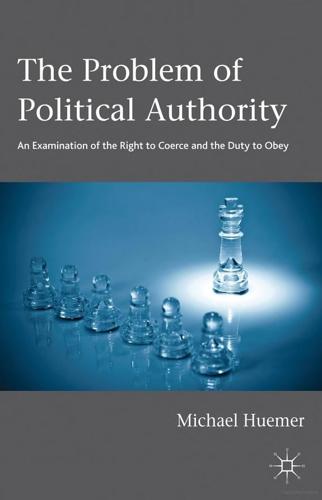
The Problem of Political Authority: An Examination of the Right to Coerce and the Duty to Obey
by
Michael Huemer
Published 29 Oct 2012
‘A Brief History of Stockholm Syndrome’, Time, August 31, 2009, www.time.com/time/nation/article/0,8599,1919757,00.html. Accessed July 20, 2010. Foot, Philippa. 1967. ‘The Problem of Abortion and the Doctrine of the Double Effect’, Oxford Review 5: 5–15. Freud, Anna. 1937. The Ego and the Mechanisms of Defence, tr. Cecil Baines. London: Hogarth. Friedman, David. 1989. The Machinery of Freedom. LaSalle, IL: Open Court. ——. 1990. Price Theory: An Intermediate Text. Cincinnati, OH: Southwestern. ——. 1994. ‘A Positive Account of Property Rights’, Social Philosophy and Policy 11: 1–16. Friedman, Milton. 1953. ‘The Methodology of Positive Economics’. Pp. 3–43 in Essays in Positive Economics.
…
It is possible for a theory that is very far from the truth to have very accurate predictions (as in the case of Ptolemaic astronomy). However, pace Friedman, I believe this is unlikely to occur for theories of human nature. 15 Marx and Engels 1978, 218. 16 It is not possible to convey the power of modern economic theory in a short space. For an excellent introduction to microeconomics, see David Friedman’s (1990) textbook, available at http://www.daviddfriedman.com/Academic/Price_Theory/PThy_ToC.html. 17 See Huemer ‘Why People Are Irrational about Politics’ (n.d.) and Caplan 2007b. 18 It is also unclear how equal communist societies in the twentieth century actually were. Vinokur and Ofer (1987, 193) estimate the Gini coefficient for the Soviet Union in 1973 at 0.31.
…
However, these alleged crime victims are unlikely to bring a court case against the drug user and unlikely to prevail in a complaint against either user or supplier. 25 These names are taken from Friedman (1989, 116–17), apparently based on modifications of the names of prominent libertarian authors. 26 See also David Friedman’s (1994) argument that rational egoists in a state of nature avoid conflict through mutual respect for rights. 27 See Brozen 1968; Friedman 1989, chapters 6–7; Green 1973. 28 Nozick 1974, 15–17. 29 Nozick 1974, chapter 5. 30 Nozick 1974, 16. 31 See Friedman 1990, 264. 32 See Canbäck et al. 2006 for theoretical and empirical discussion of economies of scale, diseconomies of scale, and the determination of efficient size for firms in an industry.
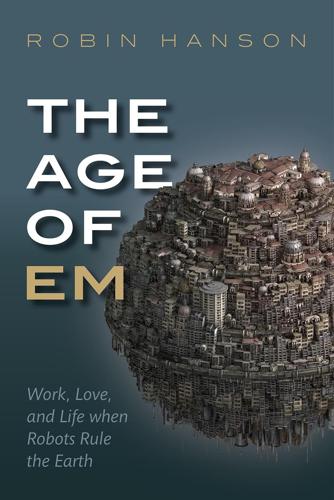
The Age of Em: Work, Love and Life When Robots Rule the Earth
by
Robin Hanson
Published 31 Mar 2016
Fridley, Jason, and Dov Sax. 2014. “The Imbalance of Nature: Revisiting a Darwinian Framework for Invasion Biology.” Global Ecology and Biogeography 23(11): 1157–1166. Friedman, Daniel, and Ryan Oprea. 2012. “A Continuous Dilemma.” American Economic Review 102(1): 337–363. Friedman, David. 1973. The Machinery of Freedom: Guide to a Radical Capitalism. New York: Harper and Row. Friedman, David. 2000. Law’s Order: What Economics Has to Do with Law and Why It Matters. Princeton University Press. Fyfe, W.D. 2011. “8 Simple Rules for Ghosts” March 28. http://wdfyfe.net/2011/03/28/8-simple-rules-for-ghosts/. Galenson, David. 2006.
…
Acknowledgments For their comments, I thank Paul Christiano, Peter Twieg, Katja Grace, Carl Shulman, Tyler Cowen, Fabio Rojas, Bonnie Hanson, Luke Muehlhauser, Nikola Danaylov, Bryan Caplan, Michael Abramowicz, Gaverick Matheny, Paul Crowley, Peter McCluskey, Sam Wilson, Chris Hibbert, Thomas Hanson, Daniel Houser, Kaj Sotala, Rong Rong, David Friedman, Michael LaTorra, Ben Goertzel, Steve Omohundro, David Levy, Jim Miller, Mike Halsall, Peggy Jackson, Jan-Erik Strasser, Robert Lecnik, Andrew Hanson, Shannon Friedman, Karl Mattingly, Ken Kittlitz, Teresa Hartnett, Giulio Prisco, David Pearce, Stephen Van Sickle, David Brin, Chris Yung, Adam Gurri, Matthew Graves, Dave Lindbergh, Scott Aaronson, Gary Drescher, Robert Koslover, Don Hanson, Michael Raimondi, William MacAskill, Eli Dourado, David McFadzean, Bruce Brewington, Marc Ringuette, Daniel Miessler, Keith Henson, Garett Jones, Alex Tabarrok, Lee Corbin, Norman Hardy, Charles Zheng, Stuart Armstrong, Vernor Vinge, Ted Goertzel, Mark Lillibridge, Michael Chwe, Olle Häggström, Jaan Tallinn, Joshua Fox, Chris Hallquist, Joshua Fox, Kevin Simler, Eric Falkenstein, Lotta Moberg, Ute Shaw, Matt Franklin, Nick Beckstead, Robyn Weaving, François Rideau, Eloise Rosen, Peter Voss, Scott Sumner, Phil Goetz, Robert Rush, Donald Prell, Olivia Gonzalez, Bradley Andrews, Keith Adams, Agustin Lebron, Karl Wiberg, Thomas Malone, Will Gordon, Philip Maymin, Henrik Jonsson, Mark Bahner, Adam Lapidus, Tom McKendree, Evelyn Mitchell, Jacek Stopa, Scott Leibrand, Paul Ralley, Anders Sandberg, Eli Lehrer, Michael Klein, Lumifer, Joy Buchanan, Miles Brundage, Harry Beck, Michael Price, Tim Freeman, Vladimir M., David Wolf, Randall Pickett, Zack Davis, Tom Bell, Harry Hawk, Adam Kolber, Dean Menk, Randall Mayes, Karen Maloney, Brian Tomasik, Ramez Naam, John Clark, Robert de Neufville, Richard Bruns, Keith Mansfield, Gordon Worley, Giedrius, Peter Garretson, Christopher Burger, Nithya Sambasivam, Zachary Weinersmith, Luke Somers, Barbara Belle, Jake Selinger, Geoffrey Miller, Arthur Breitman, Martin Wooster, Daniel Boese, Oge Nnadi, Joseph Mela, Diego Caleiro, Daniel Lemire, Emily Perry, Jess Riedel, Jon Perry, Eli Tyre, Daniel Erasmus, Emmanuel Saadia, Erik Brynjolfsson, Anamaria Berea, Niko Zinovii, Matthew Farrell, Diana Fleischman, and Douglas Barrett.
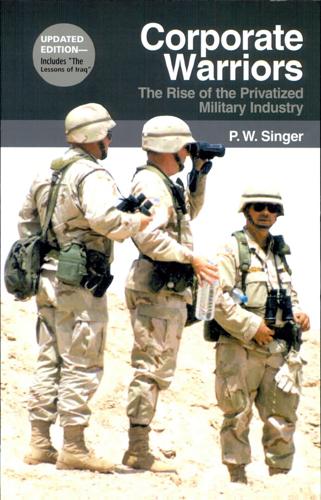
Corporate Warriors: The Rise of the Privatized Military Industry
by
Peter Warren Singer
Published 1 Jan 2003
William McNeill > The Pursuit of Power (Chicago: University of Chicago Press, 1982), p. 272. 15. Max Weber, Theory ofSocial and Economic Organization (New York: Free Press. 1964), 154. See also Martin Van Creveld. The Rise and Decline of the State (Cambridge: Cambridge University Press, 10,0,0,): John Hoffman, Beyond the State (Cambridge: Polity Press, 10,0,-5). 16. David Friedman, The Machinery of Freedom: Guide to Radical Capitalism (Lasalle, 111.: Open Court Press, 1989). 143— 159. Murray Rothbard. For a Nexo Liberty: The Libertarian Manifesto (New York: Macmillan, 1978). 17. Bruce Grant, "U.S. Military Expertise for Sale: Private Military Consultants as a Tool of Foreign Policy/* National Defense University Institute for Nationalf Security Studies, Strategy Fssay Competition. 1998, available at http://www.11du.edu/inss/books/essaysch4.html. 18.
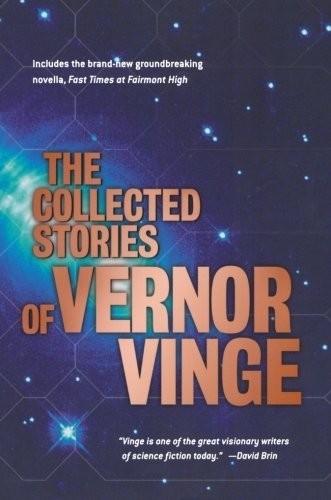
The Collected Stories of Vernor Vinge
by
Vernor Vinge
Published 30 Sep 2001
I don’t think it could work without a high degree of individual understanding (awareness of where one’s long-term self-interest lies), and a generally tranquil atmosphere; events such as those in this story had better be the exception. If you are interested in a detailed nonfiction analysis of such ideas, I strongly recommend David Friedman’s The Machinery of Freedom. If you’d like to see my future history before and after the time of “The Ungoverned,” there is a prequel novel, The Peace War, and a sequel, Marooned in Realtime. The point I make about nuclear weapons in “The Ungoverned” is more controversial (and hopefully irrelevant). In the twentieth century we lived in fear of proliferation and put what trust we had in nuclear monopolies.